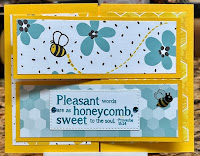 |
| Photo by Łukasz Rawa on Unsplash |
Now that my apples, plums, raspberries, blueberries, and strawberries are in bloom, it's time to focus on the all-important bee. One third of the planet's food relies on these tiny tireless creatures. Pollinators in my area include the honey bee, bumble bee, mason bee, and leaf-cutter bee. (Fig trees are actually pollinated by fig wasps.)
 |
| Available on Etsy |
Flying from blossom to blossom makes a bee thirsty! My husband has been making bee watering stations that attach to either a standard soda bottle or quart-sized Mason jar. Do the bees like them? One beekeeper gave us proof! My husband started making the larger size for beekeepers so they wouldn't need to refill them more than once daily.
 |
| Photo from Prairie Homestead |
Bees
are more than just pollinators--they also give us delicious honey and
beeswax. Speaking of beeswax, the creative buzz followed us into the
kitchen where my husband recently tried his hand at beeswax candles.
We've learned a lot in just one trial!
Wick type and size, preparation of the wick, candle size, temperature of the wax and jar, all make a big difference in a successful outcome.
While perusing one of my old books on candle making, we found the origins of some old sayings. Beeswax was mixed with a lead compound and used as a base makeup by wealthy women to enhance their beauty. This white paste was kept dry in the summer months by shielding the face from the sun with a fan. This way, the ladies could 'save face'. They were also careful never to express mirth so they wouldn't 'crack a smile'.*
However, the feeder leads to some bird injuries. Using more of my card making supplies, these holographic bees keep birds from flying into our windows. I've put half a dozen in the busiest windows to keep the birds safe.
*Source: The Candlemaker’s Companion, Storey Communications, Inc. 1997, Betty Oppenheimer












